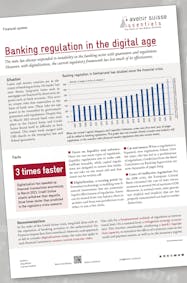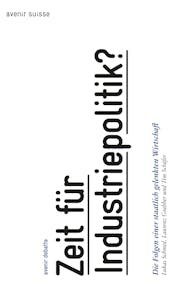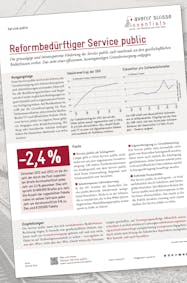Regarding old age care in particular, it will be necessary to “depoliticise” the conversion rate for occupational pensions ((the second “pillar” in Switzerland’s “three pillar” public and private pensions system, ed)), and of the minimum interest rate, along with the introduction of a more flexible nominal guarantee for old age pensions. Although the state can today borrow very cheaply, it is as much in the interest of future generations to maintain the “debt brake” ((a Swiss legislative mechanism limiting the amount of public debt that can be assumed, ed)) as it is to defend the use of cash, which, in a digital world, remains an important guarantee of individual freedom and a counterweight to ultra loose money.
There has been a fundamental change of view in monetary policy since the outbreak of the international financial crisis. As recently as a few years ago, benchmark central bank interest rates below zero would have been unthinkable. Punishing saving and rewarding consumption contradict free market principles. Nevertheless, many central banks, including the Swiss National Bank (SNB) have introduced negative rates as part of their “ultra expansive monetary policy.” Amid lively international debate, negative rates are being puffed up as a part of a new wave of “financial repression”, in which public sector bodies divert financial resources in regulated markets to lower their debts at the cost of creditors, and to boost inflation.
This has not happened so far in Switzerland. But negative real interest rates – that is to say nominal rates below the rate of inflation – have been seen in our country in the past. They occur whenever interest rate and inflation expectations are mistaken. These are the questions – particularly economic policy options amid negative rates – addressed by Alois Bischofberger and Rudolf Walser in the latest “avenir debate” publication.
No effect yet of “financial repression” in Switzerland
First the good news: Switzerland came through the financial crisis relatively unscathed. The negative consequences of ultra expansive monetary policy have also been limited. There is no suggestion of savers being dispossessed. At 35.4% of gross domestic product, state debt is relatively low. Moreover, swollen by rising stock and property markets, private household assets have grown from SFr2,450bn in 2008 to SFr3,335bn People in rental accommodation have also benefited, as historically low mortgage rates have broken the upwards spiral in rent costs. And cheap money has not triggered a feared boom in consumption, which could have prompted further imbalances.
Action urgently needed on many fronts
But there remains cause for concern about future monetary policy. An end to low rates is not in sight, and the economic risks are rising because of resulting distorted incentives. The SNB’s room for manoeuvre remains limited: the Swiss central bank is, de facto, a prisoner of European Central Bank policy. All the more important, therefore, to use whatever flexibility remains to keep risks at bay.
- Pension funds are already practising distribution policies that favour current pensioners, an approach amplified by today’s extremely low rates. In the interests of fairness between the generations, the BVG ((second pillar, ed)) conversion rate and the minimum interest rate in the obligatory section should be set according to technical instead of political criteria. A fair distribution of risk between workers and pensioners is of vital importance. Moreover, a guaranteed specific pension is problematic in a period of negative inflation. It gives pensioners a positive real return, which cannot, however, be financed on the bond market. After all, a staggering 41.3% of all household savings in Switzerland are invested in pension schemes.
- Current favourable market conditions should not open the way to higher public debt (eg via a state borrowing fund). That would be an additional unjustifiable burden on future generations. .
- Rising digitalisation is putting pressure in many countries on the use of cash. Switzerland should make every effort to resist attempts to limit cash transactions. Cash is not just an expression of individual freedom, but also a valued defence against “financial repression.” Abolishing or limiting cash payments will eliminate neither the black economy, nor tax evasion or crime.





